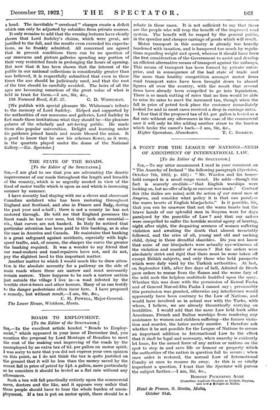A POINT FOR THE LEAGUE OF NATIONS—NEED OF AMENDMENT OF
INTERNATIONAL LAW.
[To the Editor of the SPECTATOR.] SIR,—To my utter amazement I read in your comment on " The Anarchy of Ireland " the following paragraph (Spectator, October 7th, 1922, p. 451) : " Mr. Warden and his house- hold escaped in a small cargo vessel. He adds—though the fact is scarcely credible= that English warships were looking on, but no offer of help or succour was made.' Contrast this (the italics are mine) with the action of our naval men at Smyrna, and consider what policy it is that can paralyse the warm hearts of English bluejackets." Is it possible, Sir, that you can be unaware that not the warm hearts but the brave hands of our splendid men in Smyrna were for days paralysed by the punctilio of Law ? and that our sailors were compelled to suffer the horrible mental agony of hearing, night after night, the despairing screams of women suffering violation and awaiting the death that almost invariably followed, and the cries of all, young and old and sucking child, dying in those dreadful shambles. Do you not know that some of our bluejackets were actually eye-witnesses of the violation and murder of women ? But the orders were absolutely strict and rigid that there must be none taken oft except British subjects, and only those who held passports which were duly vis6d by the Turkish authorities. At last, on September 14th, after five days of hell, Admiral de Brock gave orders to rescue from the flames and the worse fury of the wild mob the helpless multitude huddled upon the quay. Whether this was done with the permission of Kemal Pasha and of General Nur-ed-Din Pasha I cannot say ; presumably this permission was granted, otherwise any interference would apparently have been contrary to the Law of Nations, and would have involved us in actual war with the Turks, with whom, I believe, we are already theoretically carrying on hostilities. I would add that the same Law held back alike Americans, French and Italian warships from rendering any assistance to women and children suffering—the former viola- tion and murder, the latter merely murder. I therefore ask whether it be not possible for the League of Nations to secure an important addition to International Law to the effect that it shall be legal and necessary, when anarchy is evidently let loose, for the armed force of any nation or nations on the spot to step in and save life or honour or property which the authorities of the nation in question fail to secure ; when once order is restored, the normal Law of International Comity at once to resume its sway. As this is so vitally important a question, I trust that the Spectator will pursue the subject further.—I am, Sir, &c., ROBERT PICKERING ASHE (Sometime. Anglican Chaplain at Budjah, Smyrna, and now • ilutugea at Malta).
Hotel de Prance, S. Stretta, October 31st.










































 Previous page
Previous page